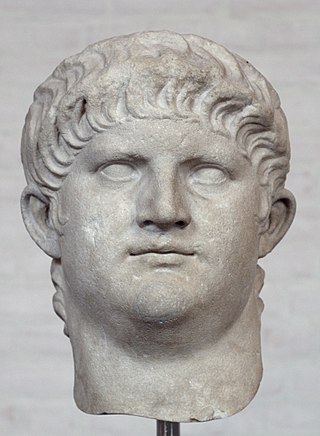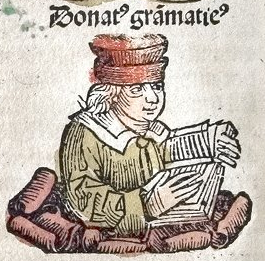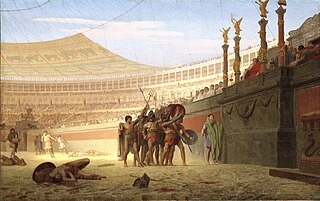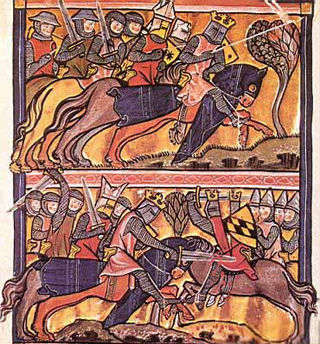Related Research Articles

Domitian was Roman emperor from 81 to 96. The son of Vespasian and the younger brother of Titus, his two predecessors on the throne, he was the last member of the Flavian dynasty. Described as "a ruthless but efficient autocrat", his authoritarian style of ruling put him at sharp odds with the Senate, whose powers he drastically curtailed.

Galba was Roman emperor, ruling from AD 68 to 69. He was the first emperor in the Year of the Four Emperors and assumed the throne following Emperor Nero's suicide.

Nero Claudius Caesar Augustus Germanicus was Roman emperor and the final emperor of the Julio-Claudian dynasty, reigning from AD 54 until his death in AD 68.

Gaius Suetonius Tranquillus, commonly referred to as Suetonius, was a Roman historian who wrote during the early Imperial era of the Roman Empire. His most important surviving work is a set of biographies of 12 successive Roman rulers from Julius Caesar to Domitian, properly titled De vita Caesarum. Other works by Suetonius concerned the daily life of Rome, politics, oratory, and the lives of famous writers, including poets, historians, and grammarians. A few of these books have partially survived, but many have been lost.

Marcus Annaeus Lucanus, better known in English as Lucan, was a Roman poet, born in Corduba, in Hispania Baetica. He is regarded as one of the outstanding figures of the Imperial Latin period, known in particular for his epic Pharsalia. His youth and speed of composition set him apart from other poets.
Lucius Annaeus Seneca the Elder, also known as Seneca the Rhetorician, was a Roman writer, born of a wealthy equestrian family of Corduba, Hispania. He wrote a collection of reminiscences about the Roman schools of rhetoric, six books of which are extant in a more or less complete state and five others in epitome only. His principal work, a history of Roman affairs from the beginning of the Civil Wars until the last years of his life, is almost entirely lost to posterity. Seneca lived through the reigns of three significant emperors; Augustus, Tiberius and Caligula. He was the father of Lucius Junius Gallio Annaeanus, best known as a Proconsul of Achaia; his second son was the dramatist and Stoic philosopher Seneca the Younger (Lucius), who was tutor of Nero, and his third son, Marcus Annaeus Mela, became the father of the poet Lucan.
The Rubicon is a shallow river in northeastern Italy, just south of Cesena and north of Rimini. It was known as Fiumicino until 1933, when it was identified with the ancient river Rubicon, famously crossed by Julius Caesar in 49 BCE.
Lucius Annaeus Cornutus, a Stoic philosopher, flourished in the reign of Nero, when his house in Rome was a school of philosophy.

Aelius Donatus was a Roman grammarian and teacher of rhetoric.
Publius Nigidius Figulus was a scholar of the Late Roman Republic and one of the praetors for 58 BC. He was a friend of Cicero, to whom he gave his support at the time of the Catilinarian conspiracy. Nigidius sided with the Optimates in the civil war between Julius Caesar and Pompeius Magnus.

De Bello Civili, more commonly referred to as the Pharsalia, is a Roman epic poem written by the poet Lucan, detailing the civil war between Julius Caesar and the forces of the Roman Senate led by Pompey the Great. The poem's title is a reference to the Battle of Pharsalus, which occurred in 48 BC, near Pharsalus, Thessaly, in Northern Greece. Caesar decisively defeated Pompey in this battle, which occupies all of the epic's seventh book. In the early twentieth century, translator J. D. Duff, while arguing that "no reasonable judgment can rank Lucan among the world's great epic poets", notes that the work is notable for Lucan's decision to eschew divine intervention and downplay supernatural occurrences in the events of the story. Scholarly estimation of Lucan's poem and poetry has since changed, as explained by commentator Philip Hardie in 2013: "In recent decades, it has undergone a thorough critical re-evaluation, to re-emerge as a major expression of Neronian politics and aesthetics, a poem whose studied artifice enacts a complex relationship between poetic fantasy and historical reality."

Vaglio Basilicata is a town and comune in the province of Potenza, in the Southern Italian region of Basilicata. It is bounded by the comuni of Albano di Lucania, Brindisi Montagna, Cancellara, Pietragalla, Potenza, Tolve and Tricarico.

Julia was the daughter of Roman dictator Julius Caesar by his first or second wife Cornelia, and his only child from his marriages. Julia became the fourth wife of Pompey the Great and was renowned for her beauty and virtue.

De vita Caesarum, commonly known as The Twelve Caesars, is a set of twelve biographies of Julius Caesar and the first 11 emperors of the Roman Empire written by Gaius Suetonius Tranquillus. The group are: Julius Caesar, Augustus, Tiberius, Caligula, Claudius, Nero, Galba, Otho, Vitellius, Vespasian, Titus, Domitian.

Avē Imperātor, moritūrī tē salūtant is a well-known Latin phrase quoted in Suetonius, De vita Caesarum. It was reportedly used during an event in AD 52 on Lake Fucinus by naumachiarii—captives and criminals fated to die fighting during mock naval encounters—in the presence of the emperor Claudius. Suetonius reports that Claudius replied "Aut nōn".

The inaugural games were held, on the orders of the Roman Emperor Titus, to celebrate the completion in AD 80 of the Colosseum, then known as the Flavian Amphitheatre.
Roman historiography stretches back to at least the 3rd century BC and was indebted to earlier Greek historiography. The Romans relied on previous models in the Greek tradition such as the works of Herodotus and Thucydides. Roman historiographical forms are usually different from their Greek counterparts, however, and often emphasize Roman concerns. The Roman style of history was based on the way that the Annals of the Pontifex Maximus, or the Annales Maximi, were recorded. The Annales Maximi include a wide array of information, including religious documents, names of consuls, deaths of priests, and various disasters throughout history. Also part of the Annales Maximi are the White Tablets, or the "Tabulae Albatae", which consist of information on the origin of the Roman Republic.

Vita Karoli Magni is a biography of Charlemagne, King of the Franks and Emperor of the Romans, written by Einhard. The Life of Charlemagne is a 33 chapter account starting with the full genealogy of the Merovingian family, going through the rise of the Carolingian dynasty, and then detailing the exploits and temperament of King Charles. It has long been seen as one of the key sources for the reign of Charlemagne and provides insight into the court of King Charles and the events that surrounded him.

Jupiter Tonans, or, in Latin spelling, ivppiter tonans was the aspect (numen) of Jupiter venerated in the Temple of Jupiter Tonans, which was vowed in 26 BCE by Augustus and dedicated in 22 BCE on the Capitoline Hill; the Emperor had narrowly escaped being struck by lightning during the campaign in Cantabria. An old temple in the Campus Martius had long been dedicated to Iuppiter Fulgens. The original cult image installed in the sanctuary by its founder was by Leochares, a Greek sculptor of the 4th century BCE.
The gens Suetonia was a minor plebeian family at ancient Rome. Members of this gens are first mentioned in the reign of Claudius, under whom the general Gaius Suetonius Paulinus, consul in AD 66, won his first military victories; but the family is perhaps best known for the historian Gaius Suetonius Tranquillus, who flourished toward the beginning of the second century.
References
- ↑ Orchard, Andy (April 7, 1994). The Poetic Art of Aldhelm. Cambridge University Press. p. 140. ISBN 9780521450904 . Retrieved 29 November 2017.